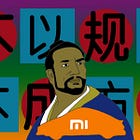Welcome to RealTime Mandarin, a free weekly newsletter that helps you improve your Mandarin in 10 minutes a week.
Subscribe today to get your fluency back, stay informed about China, and communicate with confidence in Chinese — all through immersion in real news.
One of China’s most prominent entrepreneurs, Lei Jun (雷军), is facing strong criticism over his marketing tactics.
Lei Jun is the founder of Xiaomi (小米), China’s biggest mobile phone maker, and a recent entrant into EVs and chips. He is a master marketeer, as Richard Liu (刘强东), founder of internet giant JD, once said:
We shouldn’t compete with Lei Jun on marketing, whose revenue from smartphones can reach hundreds of billions. He’s definitely not an ordinary man.
咱们这组不要跟雷军比营销,他能把手机卖到几百个亿,绝不是一般人。
But Lei Jun’s marketing magic backfired last week when one of his social media posts got him in trouble.
He was proudly announcing how Xiaomi’s YU7 EV had topped the charts in a winter range test by Autohome (汽车之家), China’s largest online automotive platform. In his post, Lei Jun proclaimed:
“Xiaomi YU7 participated in Autohome’s winter test and ranked first in EV range!”
小米YU7参加汽车之家冬测,冬季续航测试第一!
The key phrase here is “winter test” (冬季测试).
The Autohome test report said “test in near-winter conditions” (准冬测), not “winter test” (冬季测试) as Lei Jun suggested in his social media post. That’s a big difference: the temperature of a “near winter test” (准冬季) is around 10°C. While industry-standard “winter testing” (冬季测试) should be -10°C or lower — typical winter temperatures in northern China in which EV batteries struggle.
But this crucial difference — the character “near” (准), and around 20°C — was conveniently missing from Lei Jun’s self-congratulatory announcement.
This did not go unnoticed: observers on social media and in the media criticised Lei Jun for his misleading wordplay.
Xiaomi has come under fire for misleading marketing before.
There’s even a phrase for it in Chinese: “big claims in large font, disclaimers in fine print” (大字宣传,小字免责), or “small print-ism” (小字文学), or even more direct, “Xiaomi style marketing” (小米式营销).
Xiaomi is a pro at this. Here are some of it’s recent small print-isms:
In September, Xiaomi’s latest smartphone, the Mi 17 Pro — in which they intentionally skipped number 16 to catch up with Apple — was promoted as the “King of Backlight Photography” (逆光之王), highlighting the power of its new camera. But the small print on billboards revealed it was just a “product design goal” (产品设计目标).
An advertisement for Xiaomi’s new EV model, the YU7, claimed in large print it was made of “Xiaomi Ultra-Strong Steel” (小米超强钢). But the footnote explained this was merely a “project name” (项目名称).
And in promotional materials for the SU7 Ultra, Xiaomi claimed it was the “fastest four-door production car on Earth” (地表最快四门量产车), but the fine print said “the goal is to become” (目标成为).
Related
In China’s increasingly sensitive consumer environment, such “small print-isms” are becoming unacceptable. And while these practices are industry-wide and not unique to Xiaomi, the company’s prominence has made it a target for public criticism:
Xiaomi’s swift rise has inevitably drawn public backlash, just like how the tallest tree catches the strongest wind.
“树大招风”的小米还是成了部分网友的”情绪宣泄口”
Part of the problem is Lei Jun himself.
He is one of the few Chinese entrepreneurs who is consistently visible and vocal in the media. Lei Jun is a brand, or “IP” as they say in Chinese. His pull on social media is unique — with a following of over 44 million on Douyin alone.
Until recently, he has skilfully cultivated his image, and built a strong connection with consumers, who call themselves “Mi-fans” (米粉), a play on the word for “rice noodles”. This is all while he deftly stays on message politically, and steers clear of anything that might provoke official disapproval.
But as with so many media savvy entrepreneurs in China, that skillset is becoming a liability.
An early warning sign that there may be trouble ahead for Lei Jun is the proliferation of mocking nicknames.
Like fallen stars before him — Li Jiaqi (李佳琪) and Viya (微亚) — Lei has accumulated several unflattering monikers.
“Lei Jobs” (雷布斯), a mashup of Lei Jun’s surname and the Chinese transliteration of Steve Jobs (乔布斯). Once a compliment, it’s now used ironically.
“Leaky Lei” (雨田君), a play on Lei Jun’s surname (雷), which means “thunder”, broken down into its constituent parts “rain” (雨) and “field” (田). While his name, Jun (军) is replaced by the respectful same-sounding suffix in Japanese (君), which is subtle sarcastic jab.
“Lei-style” (雷氏 or 雷式) uses a suffix typically for a clan or formal school of thought, suggesting Lei’s marketing disasters have become so notorious they constitute their own recognisable methodology.
“Little Lei” (雷子) which uses the suffix meaning “child”. This started out as an affectionate nickname, and is often used between friends in the northern dialect. But here it carries a mocking tone.
And finally, let’s not forget Lei Jun’s most recent label: “out of touch middle-aged man” (老登), the internet slang describing successful but arrogant middle-aged men disconnected from reality, which we discussed just two weeks ago.
This recent string of PR disasters, and the long list of new unflattering nicknames for Lei Jun should serve as a wake-up call. Consumers expect more from one of China’s biggest and most high-profile companies. They want less marketing spin and small print, and more focus on product performance and quality.
So that’s what we’re exploring this week!
Favourite Five
1. 蹭 cèng
to take advantage of, to piggyback
“蹭苹果”就成了“米式营销”的标志性标签 - “Piggybacking on Apple” has become a signature move of “Xiaomi-style marketing”. [1]
2. 忽悠 hū you
to fool, to mislead
营销的尽头是忽悠 - The ultimate form of marketing is trickery. [4]
3. 小聪明 xiǎo cōng ming
petty cleverness, shortcuts
营销的尽头从来不是“小聪明”,而是“真功夫” - Great marketing is never built on clever tricks but on quality products. [1]
4. 树大招风 shù dà zhāo fēng
the tallest tree catches the strongest wind
“树大招风”的小米还是成了部分网友的“情绪宣泄口” - Xiaomi’s swift rise has inevitably drawn public backlash, just like how the tallest tree catches the strongest wind. [1]
5. 人红是非多 rén hóng shì fēi duō
the more famous you are, the more controversy you attract
不过企业家也是人,还有人红是非多的情况 - But entrepreneurs are human too, and fame naturally brings controversy. [2]
🎧RTM Podcast Preview
This week on the RTM Advanced podcast, we explain more about “Xiaomi marketing” (小米营销) tactics, and phrases you can use to discuss them:
“to piggyback” (蹭 cèng)
“to mislead” (忽悠 hū you)
“ trick” (套路 tào lù)
“gimmick” (噱头 xué tóu)
“petty cleverness” (小聪明 xiǎo cōng ming)
Tune in at 7 minutes where we break down what they mean and and how native speakers use them…
And how you can use them in real conversations right now and show off your amazing Chinese!
Consuming the Conversation
💡 Ready to get inspired to bridge the gap to real-world fluency? 💡
In every RTM Advanced post you unlock content and tools to inspire you, and help you get fluent.
So, ready to finally get started and wave goodbye to that nagging rusty feeling?
Let’s jump in👇
Consuming the Conversations
Useful words
6. 炸锅 zhà guō
to explode (figuratively), to cause an uproar
本想高调炫耀小米YU7的续航战绩,没成想评论区直接炸锅 - He wanted to show off Xiaomi YU7’s impressive range, but to his surprise, it drew massive backlash in the comments section. [1]
7. 套路 tào lù
scheme, trick
“米式营销”中的那些“小套路” - Those little tricks in “Xiaomi-style marketing”. [1]
Related:
玩套路 wán tào lù - to play tricks, to use schemes
8. 对标 duì biāo
to benchmark, to model after
这也离不开小米多年来“对标”苹果的营销手法 - This owes much to Xiaomi’s long-standing strategy of benchmarking itself against Apple in its marketing. [1]
9. 把柄 bǎ bǐng
handle, something to hold against someone
从“行业常规操作”变成了“被吐槽的把柄” - What used to be considered standard industry practice has now become a target of criticism. [1]
10. 圈粉 quān fěn
to attract fans, to win followers
近期创始人的一些公开演讲从“圈粉”变成“多了些争议” - Lately, the founder’s public appearances have moved from fan magnets to sources of debate. [2]
11. 噱头 xué tóu
gimmick
情怀也好,流量也罢,营销不过是噱头 - Be it for sentiment or for traffic, marketing is nothing more than a gimmick. [2]
12. 愚弄 yú nòng
to fool, to make a fool of
你造出来的一个个新名词,配上一排排超级小字,是不是在一次次愚弄大众? - All those shiny buzzwords and tiny disclaimers — are they really innovation, or just another way to dupe the public? [3]
13. 碾压 niǎn yā
to crush, to overwhelm
我没有看到幽默,我看到是对听众智商的侮辱性碾压... - There’s nothing humorous about it; it’s a blatant insult to the audience’s intelligence. [4]

















